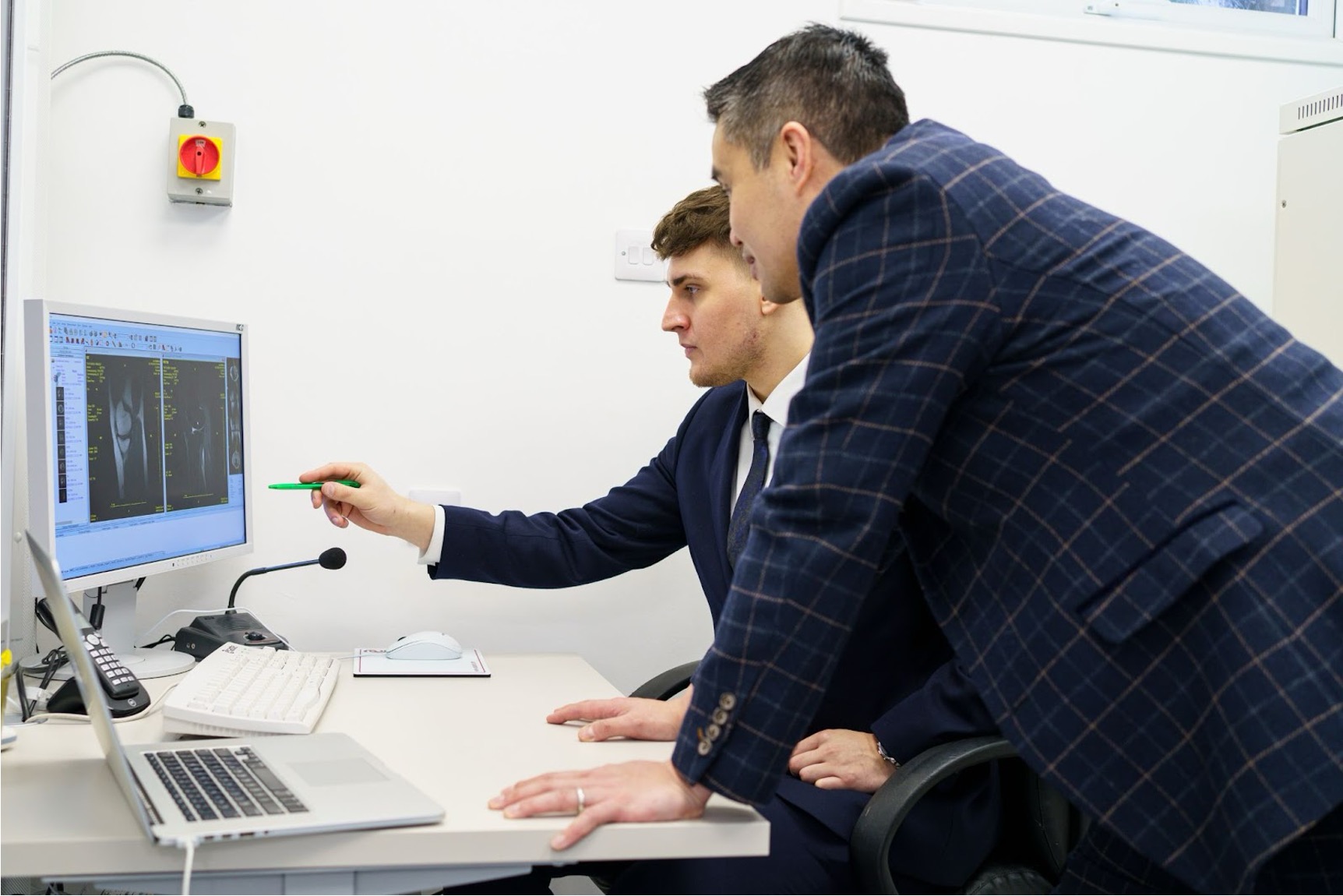Occipital Neuralgia: Symptoms, Causes, Treatment & Exercises
:format(webp)/cdn.mskdoctors.com/storage/2025/3/5r1SNdYayaEodArIgn0HhPTHGq6W1XAd.jpg)
Key Takeaways
-
Occipital neuralgia is a neurological condition involving inflammation of nerves that can cause intense, electric shock-like pain.
-
Various underlying health conditions like diabetes, arthritis, and spinal degeneration can increase the risk of developing occipital neuralgia.
-
Treatment options range from medications and physical therapy to advanced surgical interventions.
-
Specific exercises like chin tucks and neck rotations can help alleviate pain and improve neck mobility.
-
MSK Doctors offers cutting-edge MAI (Motion AI) technology and personalised care to detect and effectively manage occipital neuralgia.
Understanding Occipital Neuralgia
What is Occipital Neuralgia?
Occipital neuralgia is a neurological condition characterised by inflammation of the occipital nerves, which carry messages from the brain through the scalp. The condition involves three distinct nerves on each side of the scalp: the greater occipital nerve, lesser occipital nerve, and third occipital nerve.
Who is Most Likely to Develop Occipital Neuralgia?
People with degenerative disc disease and those with diabetes are particularly susceptible to this neurological disorder. Other conditions that can increase the likelihood of developing this condition include gout, osteoarthritis of the upper spine, and vasculitis, which is an inflammation of blood vessels.
Duration and Characteristics
Occipital neuralgia pain can be brief, lasting only seconds, or persist for hours. Most individuals experience symptom reduction with appropriate treatment, and pain typically subsides as nerve damage heals.
|
Symptoms of Occipital Neuralgia

Sharp, throbbing pain in the back of the head and neck is a common symptom of occipital neuralgia.
Pain Characteristics
Typically, patients describe the sensation as aching, burning, or similar to an electric shock. The pain can feel sudden and sharp or develop into a throbbing sensation. The experience varies from person to person - some patients feel sharp, brief jolts, while others experience more prolonged discomfort.
Distinguishing from Migraines
Unlike migraines, occipital neuralgia typically does not cause nausea and is less likely to involve light sensitivity. The pain is often triggered by specific movements or touches to the scalp, which distinguishes it from other headache disorders. Patients may notice that simple actions like combing hair or lying on a pillow can provoke intense pain.
Causes of Occipital Neuralgia
Primary Triggers
Pinched nerves in the neck represent a primary cause, often resulting from physical injuries or chronic muscle tension. Head and neck injuries can directly impact the occipital nerves and cause inflammation and pain. Tight muscles pressing on nerves create additional complications, potentially compressing the delicate nerve pathways.
Underlying health conditions play a significant role in occipital neuralgia's development. Arthritis can cause inflammation and nerve compression, while conditions like diabetes and gout can affect nerve health. Spinal degeneration, infections, and generalized inflammation can also contribute to the onset of this painful condition.
Diagnosing Occipital Neuralgia
Diagnosing occipital neuralgia can be tricky due to its similarity to other headache disorders. Healthcare professionals typically begin with a comprehensive physical and neurological examination.
Advanced imaging tests such as CT scans and MRIs may be used to rule out other potential causes. Ultrasound technology can also help identify specific trigger points responsible for the pain.
Treatment Options for Occipital Neuralgia
Nonsurgical Treatments
Nonsteroidal anti-inflammatory drugs provide initial pain relief and help reduce inflammation. Muscle relaxants can address underlying muscle tension, while anticonvulsant medications help calm nerve activity.
Occipital nerve block injections (injecting a mixture of pain medicine and steroids) into the back of your skull where the nerves are located have shown promise in managing nerve-related pain by temporarily reducing muscle tension and nerve sensitivity.
Occipital nerve stimulation involves placing electrodes near the affected nerves to interrupt pain signals. Spinal cord stimulation uses similar electrode placement between the spinal cord and vertebrae to block pain messages.
Physical therapy has targeted exercises and techniques to alleviate muscle tension and improve neck mobility. Massage therapy can help release tight muscles and improve circulation. Heat therapy provides immediate relief by relaxing muscle groups and reducing pain.
Surgical Interventions
In more complex cases, procedures like ganglionectomy or occipital release surgery may be recommended as last-resort treatments.
Exercises for Alleviating Occipital Neuralgia Pain
Chin Tucks
Chin tucks target the front neck muscles, helping to strengthen muscles, improve posture, and relieve pressure on occipital nerves.
-
To perform chin tucks: Sit or stand with your spine aligned and shoulders back. Gently draw your chin straight back, creating a "double chin." Hold this position for 5 seconds, then release. Repeat 10 times. Maintain level eyes and jaw, keeping the movement controlled.
This exercise realigns the cervical spine and is especially beneficial for those who spend long hours at a desk or computer.
Neck Rotation Exercises
Neck rotations enhance cervical spine flexibility, easing muscle tension and reducing occipital neuralgia pain.
-
To perform neck rotations: Sit or stand upright with relaxed shoulders. Slowly turn your head to one side until you feel a gentle stretch, avoiding overextension. Hold for 15-30 seconds. Return to the starting position and repeat on the opposite side. Complete 5 rotations on each side.
Regular practice improves neck mobility and prevents muscle stiffness that can worsen neuralgic pain.
Important Cautions
-
Stop immediately if any exercise causes pain
-
Consult a healthcare professional before starting a new exercise regimen
-
Prioritize proper form and controlled movements
How MSK Doctors Help?

MSK Doctors offer advanced regenerative treatments and nerve care solutions for occipital neuralgia.
At MSK Doctors, our team of experienced musculoskeletal and pain management specialists brings extensive expertise in diagnosing and treating occipital neuralgia.
We understand the complex nature of this challenging condition and are committed to providing personalised care that addresses each patient's unique medical needs.
Through a thorough evaluation of symptoms, medical history, and potential underlying causes, we develop targeted treatment plans designed to deliver the most effective outcomes possible.
Comprehensive and Collaborative Care Approach
We offer a comprehensive range of treatment options, from conservative approaches to advanced medical techniques. This includes medication management, physical therapy, nerve blocks, lifestyle modifications, and specialised exercises designed to alleviate pain and prevent future flare-ups.
We believe in collaborative care, maintaining close communication between our specialists, your primary care physician, and other healthcare providers to ensure a coordinated treatment strategy that addresses all aspects of your condition.
Empowering Patients Through Advanced Care

MSK Doctors use cutting-edge diagnostics to create personalised treatment plans for occipital neuralgia.
We use cutting-edge MAI (Motion Artificial Intelligence) technology to capture and analyze subtle body movements, offering insights that traditional methods often miss.
Through personalised diagnostics and treatment plans, we help you manage your health journey with confidence and improve your quality of life.
Take control of your pain - schedule your consultation with our MSK Doctors today and start your journey to relief.
Frequently Asked Questions (FAQ)
What is occipital neuralgia?
Occipital neuralgia is a neurological condition characterised by inflammation of the occipital nerves, causing intense pain that typically starts at the base of the skull and can spread through the scalp.
What are the primary symptoms of occipital neuralgia?
Symptoms include sharp, burning, or electric shock-like pain, often triggered by scalp touch, head movements, or simple activities like combing hair or lying on a pillow.
What treatment options are available?
Treatment ranges from nonsurgical approaches like medications, physical therapy, and nerve blocks to surgical interventions such as occipital nerve stimulation or spinal cord stimulation.
How long does occipital neuralgia pain typically last?
Pain can vary from brief seconds to several hours, with most patients experiencing symptom reduction through appropriate treatment.
Why should I choose MSK Doctors for occipital neuralgia treatment?
MSK Doctors provides comprehensive care using cutting-edge MAI (Motion AI) technology, offering personalised treatment plans, advanced diagnostic capabilities, and a patient-centered approach to effectively manage occipital neuralgia.
:format(webp)/cdn.mskdoctors.com/storage/2025/5/qf6zY2JVctL0BGJLEryU4lLIeRBsr5fC.jpg)
:format(webp)/cdn.mskdoctors.com/storage/2025/5/J26J2SuguZTzYNmqcI1EFk6a2wJsUF4a.jpg)
:format(webp)/cdn.mskdoctors.com/storage/2025/5/C4LMXVp2sVqlw6pSc34aXpbl7ZEFTXUS.jpg)
